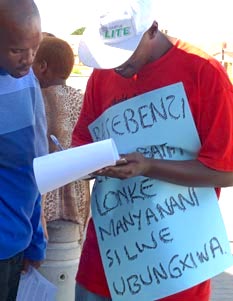
Sign reads “Workers of the World, Unite for Communist Revolution” in Xhosa Student Strike in South Africa:
PORT ELIZABETH (South Africa), March 30— The conflict in Ukraine has ramifications far beyond Europe. A case in point is what happened at a college here.
Students went on strike because they have not received the government support that international students and those from the provinces are supposed to get for accommodation and food. The reason they have not received anything is corruption. The money allocated to them was supposedly “lost.” How do you lose two billion Rands (about US$140 million)?
Students find it hard to afford basic things. Because of the conflict in Ukraine, prices have skyrocketed. For example, the cost of 750 ml of cooking oil has doubled from 50 to 100 Rands. No one is feeling this more than students and the working class.
We just came from Covid and many the people were laid off, and some outright let go, by the bosses. Now, to add insult to injury, the students also are suffering the same fate. Most come from working-class families that have been decimated by Covid.
This was the major reason for the strike. The war in Ukraine contributed to this. It is up to us to draw the conclusion that Ukraine may seem far away, but what happens there has a direct or indirect relationship to South Africa.
What is the Party doing? Some say that communism is wrong, but the important thing is to find solutions. One comrade has taken two students who are struggling with accommodations into his house. “It builds communist relations with future members of the Party,” he explained. “They know I am a communist. I am struggling with them to join the Party and they have seen the generosity of communism. We will always help according to our ability, which I have done, and I am confident that those we have helped, as soon as they are in a position do so, will do the same.”
One of these students has agreed to join the Party and the other has not yet decided. This requires us to struggle with them around our communist ideas and dispel whatever misconceptions or apprehensions they might have about communism.
Another thing that has divided students during this strike is xenophobia. Most of the students from South Africa are struggling, but the international students from Botswana, Swaziland, and Zimbabwe are in the same position. So it does not make sense to exclude them from government assistance. The EFF party called for help to “South Africans first.” This is a wrong approach because we are all students, all Africans, and help should not be distinguished by where you come from.
This has been our approach. With this approach we will win lots of students from different parts of the continent to our cause. We have been struggling with two international students around our ideas. And they can take these ideas back to where they come from.
Read Our Pamphlet: “Fight for the Day When no Worker Will be Called Foreigner” here

